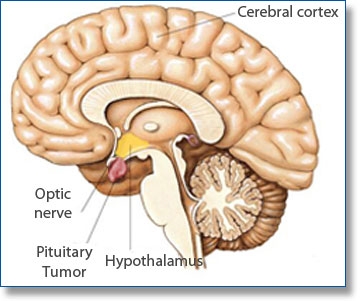
Pituitary gland is a small endocrine gland situated just below the brain. Pituitary gland is referred to as the master gland in our body. It is called so because the hormones releasing by this gland affects almost all functions in our body.
Tumors which form in the pituitary gland are called pituitary tumors. Most pituitary tumors are non-cancerous and do not spread to other parts of the body. So these are called pituitary adenomas. But it can create significant health problems.
- Pituitary tumors may be either functioning or non-functioning
Pituitary adenomas can be divided into two types based on its size:
- Microadenomas are pituitary tumors that are smaller than 1 cm.
- Macroadenomas are tumors having size above 1 cm across.
There are three types of pituitary adenomas based on its biological functioning.
Benign pituitary adenomas are the tumors which are not cancerous. It does not spread from the pituitary gland to surroundings or other parts.
Invasive pituitary adenomas are tumors which may invade the skull bone.
Pituitary carcinomas are cancerous .These rare carcinomas can spread into brain or outside of the central nervous system.
CAUSES
The causes of pituitary tumours are still unclear. There is no any lifestyle related or environmental causes of pituitary tumours yet studied. Most of the scientists suspect that any alterations or changes that occur in the genetic material may be the prime cause of pituitary tumours.
Pituitary tumors may occur when changes in DNA that activates oncogenes and turn off tumour suppressor genes happen. Oncogenes are those genes that help cells to grow and divide actively. Tumour suppressor genes restrict the growth and division of cells. So such a genetic alteration can definitely lead to uncontrolled growth of cells.
RISK FACTORS
- Adults
- Inheritance of genetic disorders like endocrine neoplasia, type I (MEN1) and McCune-Albright syndrome
SYMPTOMS
Common symptoms of pituitary tumours are,
- Headache
- Vision problems
- Nausea and vomiting
- Change in body weight
- High blood pressure
- Diabetes mellitus
- Change in menstrual cycle in women
- Erectile dysfunction
- Weakness and loss of appetite
- Body hair loss
- Frequent urination
CONDITIONS RESULTING FROM THE OVERPRODUCTION OF HORMONES
- Adrenocorticotropic hormone (ACTH) - secreting tumors produce excess adrenocorticotropin, causes increases cortisol secretion by adrenal gland. This subsequently causes Cushing’s syndrome, which is characterized by increased fat around the neck, weakened muscles and fragile skin.
- Growth hormone-secreting tumors - These tumors produce too more growth hormone, leads to acromegaly. Visual disturbances may result from it.
- Prolactin-secreting tumors (Prolactinoma) produce excess prolactin. It will restrict the normal production of sex hormones, oestrogen in females and testosterone in males.
The major symptoms of prolactinoma in females are irregular or lack of menstrual cycle or breast milk production when she is not pregnant.
In males, symptoms may be erectile dysfunction, infertility or loss of sex drive
- Thyroid-stimulating hormone-secreting tumors Overproduction of thyroid-stimulating hormone by pituitary tumor causes too much production of thyroxine by thyroid your thyroid gland. This condition is called hyperthyroidism.
DIAGNOSIS
To diagnose your pituitary tumors, your doctor would be conducted the following tests.
- Blood and urine tests are conducted to measure hormone levels. Thus deficiency or overproduction of hormones can be detected.
- Brain imaging A CT or MRI scan can trace the size and location of your pituitary tumors, if you have.
- Vision testing may be conducted to know whether a pituitary tumor has impaired your vision.
- Dexamethasone suppression test is conducted to check cortisol level in the blood.
- Venous sampling for pituitary tumors: A blood sample taken from the veins coming from the pituitary gland is checked for the measurement of ACTH released into the blood by gland.
TREATMENTS
Treatment for a pituitary tumors depends on various factors like the type and size of tumor, whether the tumor is secreting, how far it has spread in your brain, your age and overall health.
Pituitary tumors are commonly not cancerous and won’t spread. But as they grow, they can exert pressure on your brain. It will cause serious problems. So treatment is often necessary.
Surgical removal of pituitary tumor needs to be performed especially if the tumor is pressing on the optic nerves as it can lead to blindness.
The common way of removing pituitary tumor is Endoscopic transnasal transsphenoidal approach. In this method, tumor would be removed through your nose and sinuses.
Transcranial approach- complicated tumors will be removed through the skull.
Radiation therapy can be used to destroy or shrink tumors.
Certain medications may be helpful to prevent excessive hormone production or to shrink tumors.
- The drugs like bromocriptine or cabergoline can treat tumors that release prolactin.
- Medications like somatostatin analogs and pegvisomant can cure tumors that release growth hormones.


